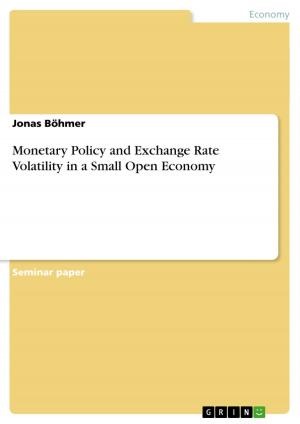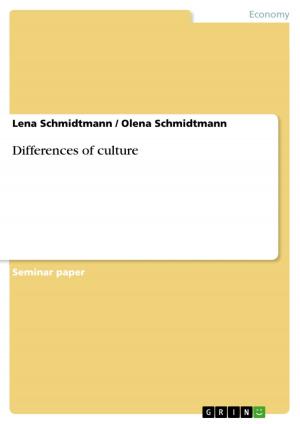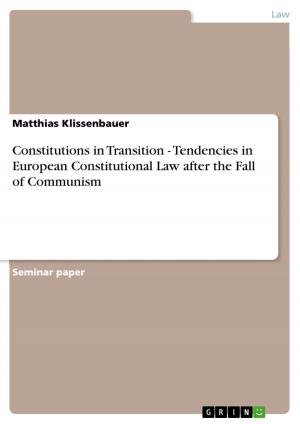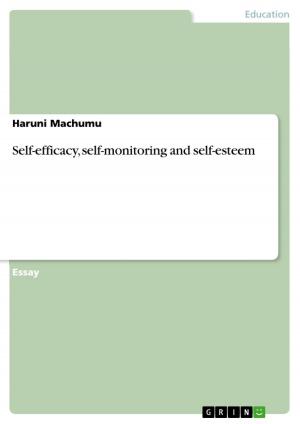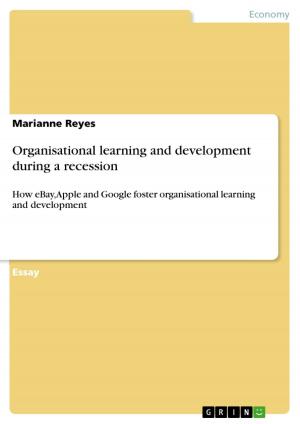Which role does South Africa play in Africa?
An analysis of the foreign policy of South Africa in regard to regional integration in Southern Africa.
Nonfiction, Social & Cultural Studies, Political Science, International, International Relations| Author: | Florian Pretz | ISBN: | 9783640142200 |
| Publisher: | GRIN Publishing | Publication: | August 21, 2008 |
| Imprint: | GRIN Publishing | Language: | English |
| Author: | Florian Pretz |
| ISBN: | 9783640142200 |
| Publisher: | GRIN Publishing |
| Publication: | August 21, 2008 |
| Imprint: | GRIN Publishing |
| Language: | English |
Seminar paper from the year 2008 in the subject Politics - International Politics - Region: Africa, grade: 2,0, Nelson Mandela Metropolitan University (Faculty of Arts), course: Master course: The political economy of regional integration in Southern Africa, 16 entries in the bibliography, language: English, abstract: 'The shackled continent' - that is Robert Guest's chosen title for his book about decades of failure on the African soil (Guest 2004). And indeed, Africa suffered from years of economic crisis, political violence and genocides, food shortages and nature catastrophes. Many people have lost their hopes in Africa but there is still a chance for a bright future of the indigenous continent. No, there is no easy solution for Africa, but there are several ways how to improve Africa's situation. One way out of the misery is the concept of regional integration. Based on the perception that African nation states can't compete with global players in a networked world, regionalism offers the power of the many. For Africa, whose economically strongest nation state South Africa is not even producing 0,5% of the worldwide GDP (Notshulwana 2004: 58), regionalism seems to be a chance out of poverty. But the conditions need to be created in terms of stable democracies, qualified leadership and guaranteed rights in every single state. In this assignment I will analyse the role of the big player South Africa on the continent as well as within the Southern African Development Community (SADC) guided by the question: Which role does South Africa play in Africa? In the beginning I will have a look at the process of regional integration in southern Africa in the light of regionalism all over Africa. It will be surveyed what goals are formulated for SADC and which progress was make up till now. The foreign policy of Post-Apartheid South Africa will be broached in chapter two. I will further analyse South Africa's guidelines towards the SADC and investigate which role the rainbow nation normatively wants to play in Africa. Equipped with basic knowledge about the institution SADC and South Africa I will then make my points on the core issue of this paper: Does South Africa got the resources to act as a hegemon on the continent like the United States in America? Is the government willing to play that role or are the pretensions different? In chapter 3 I will work out South Africa's hegemonic tendencies and compare them in chapter 4 with the power term Zivilmacht. Both chapters will first focus on southern Africa and then broaden the view on the whole continent. The conclusion will contain an evaluation - South Africa's status quo: a hegemon or Zivilmacht?
Seminar paper from the year 2008 in the subject Politics - International Politics - Region: Africa, grade: 2,0, Nelson Mandela Metropolitan University (Faculty of Arts), course: Master course: The political economy of regional integration in Southern Africa, 16 entries in the bibliography, language: English, abstract: 'The shackled continent' - that is Robert Guest's chosen title for his book about decades of failure on the African soil (Guest 2004). And indeed, Africa suffered from years of economic crisis, political violence and genocides, food shortages and nature catastrophes. Many people have lost their hopes in Africa but there is still a chance for a bright future of the indigenous continent. No, there is no easy solution for Africa, but there are several ways how to improve Africa's situation. One way out of the misery is the concept of regional integration. Based on the perception that African nation states can't compete with global players in a networked world, regionalism offers the power of the many. For Africa, whose economically strongest nation state South Africa is not even producing 0,5% of the worldwide GDP (Notshulwana 2004: 58), regionalism seems to be a chance out of poverty. But the conditions need to be created in terms of stable democracies, qualified leadership and guaranteed rights in every single state. In this assignment I will analyse the role of the big player South Africa on the continent as well as within the Southern African Development Community (SADC) guided by the question: Which role does South Africa play in Africa? In the beginning I will have a look at the process of regional integration in southern Africa in the light of regionalism all over Africa. It will be surveyed what goals are formulated for SADC and which progress was make up till now. The foreign policy of Post-Apartheid South Africa will be broached in chapter two. I will further analyse South Africa's guidelines towards the SADC and investigate which role the rainbow nation normatively wants to play in Africa. Equipped with basic knowledge about the institution SADC and South Africa I will then make my points on the core issue of this paper: Does South Africa got the resources to act as a hegemon on the continent like the United States in America? Is the government willing to play that role or are the pretensions different? In chapter 3 I will work out South Africa's hegemonic tendencies and compare them in chapter 4 with the power term Zivilmacht. Both chapters will first focus on southern Africa and then broaden the view on the whole continent. The conclusion will contain an evaluation - South Africa's status quo: a hegemon or Zivilmacht?

